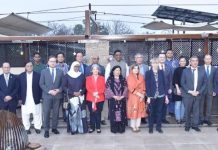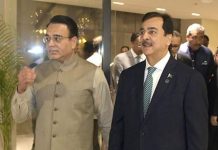Samra Athar Kakakhel
From its inception, Franco-Pakistan relations were warm; both countries had diplomatic ties shortly after Pakistan’s independence. France was one of the first non-Muslim states to recognize Pakistan, opening its embassy about 2 months after Pakistani independence. We remember that the first French ambassador to Pakistan was appointed in December 1947, even though the first Pakistani ambassador to France was appointed in the early 1950s. Goodwill messages were exchanged between the leaders of the two countries, with Pakistan’s founder, Quaid e Azam Muhammad Ali Jinnah, honoring France. In 1948, he addressed the first French ambassador to Pakistan that “the rich history of your great country and its accomplishments are well known to the world”.
The government and people of Pakistan have greatlyappreciated ion respectfor the high democratic principles that underpin the magnificent state. As every scholar of international history is aware, the cry of liberty, fraternity, and equality which was raised during your Great Revolution and officially adopted by your great Republic had its repercussions throughout the world as is known to every student of history. These ideals and principles are still keeping many victimized nations optimistic, and in a July 1948 message to the French president, he stated that France and Pakistan will collaborate together to re-establish stability and prosperity in today’s distracted world, but colonialism was at first used to keep the two countries away from each other.
France considered Pakistan as a “state deserving of attention” but was a major foreign supplier to the Pakistan Armed Forces. France had been an important partner in the early 1960s, particularly for the PAF and the Navy. We actually remember France delivering the first batch of Mirage jets as well as submarine technology to Pakistan. In early 1990, the PAF bought a batch of the used Mirage fighters, followed by the signing of a contract for 40 fighter aircraft. From 1967 to the 2000s, the Pakistan Air Force was France’s greatest customer, purchasing a large number of fighter and commercial aircraft. The Navy also has a long-standing defense relationship with France, which is best recognized for its purchase of the Daphne class and the submarine technology transfer of the Agosto class which was signed in 1994.
Pakistan desires the same degree of collaboration with France as it enjoyed in the 1990s. The Pakistani government aimed to produce a draft roadmap aimed at renewing and strengthening Pakistan-France bilateral ties in all domains, including politics, economics, education, culture, science and technology, and counter-terrorism. For friendly relations, there ought to be a proper strategic plan to team up with Pakistan and support initiatives for increased scientific and technological cooperation, particularly in the fields of environment, climate change, green technologies, information and communication commerce, digitalization of economies, Financial technology, and agriculture, engineering, medical sciences, humanities, social sciences, and management sciences.
In late 2000, France agreed to provide financial support to Pakistan’s development of nuclear power use. “France has promised to give Pakistan commercial nuclear technology. The French Foreign Ministry confirmed that the country was ready to “cooperate with Pakistan” in the domain of nuclear safety within the context of its international agreements. “This is to guarantee that Pakistan’s program develops in the safest and most secure settings possible,” France stated after the agreement “This is the beginning of a civil nuclear partnership, but cooperation limited to nuclear safety. Later, in order to ease Indian fears, France stopped selling heavy military equipment to Pakistan in 2011.
To continue development assistance in connection with Sustainability, we must encourage and follow the EU’s best practices and concepts. Recognize specific programs by having signed required agreements between academic institutions, higher education institutions, and industries in both countries, and also explore venues for training cooperation in the area of nuclear medicine. Boosting and formalizing links between academic and research institutions, universities, and think tanks, offering scholarships and programs of faculty and student exchange, and developing technical and vocational training capacity building, training of trainers, and expertise to raise the quality of technical and vocational Centers, quality assessment, exploring future possibilities.
Following post-doctoral training for Pakistani professors and researchers will encourage the growth of short-term visits to partner country institutions via Ph.D. and post-doc scholars studying in Pakistani or French institutions to work on research programs. To strengthen and advance linguistic and cultural ties, including via joint festivals, cultural weeks, education weeks, and the exchange of musicians, artists, cultural groups, and fashion industry entrepreneurs, as well as to motivate Pakistani culture professionals to visit France for programs run by the French Ministry of Culture, and to support young emerging creators and artists in Pakistan. Thus, the collaboration between two parties would encourage missions of institutions from both nations aimed at further developing cooperation in this domain and future cooperation.
Regular meetings with the Embassy must be held to coordinate and review progress on cultural and language collaboration, and to deepen cooperation between ministries, departments, and organ organizations on both sides in the sectors of heritage, archaeology, museums, and so on.
Pakistan and France already have warm and cordial relations these days, and both nations are working to strengthen bilateral cooperation in many domains, particularly increasing two-way commerce. All of these measures will pave the way for Pakistan and France to strengthen existing economic and trade ties. Such high tackle, combined with efforts for bilateral collaboration in numerous fields, would boost and strengthen Pakistan’s bilateral economic ties.












